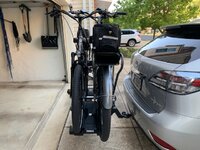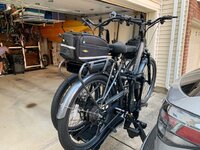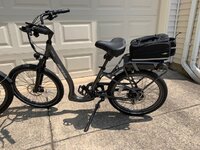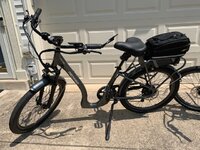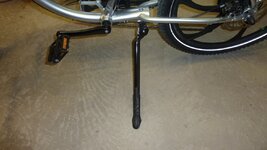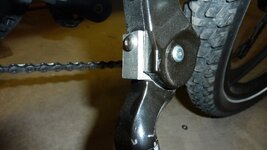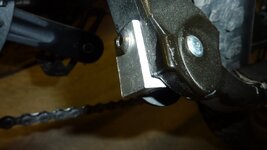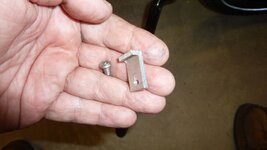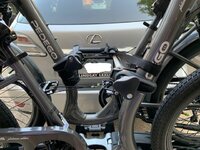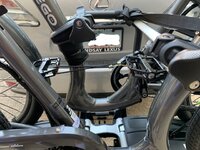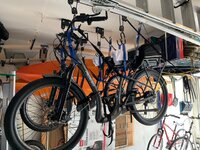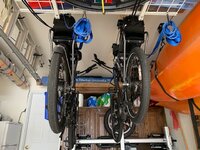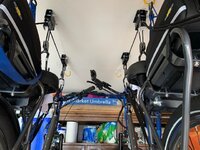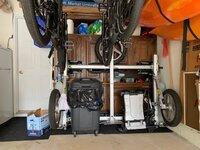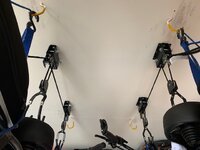Boomerang Platinum and Thule Easyfold XT Bike Rack Impressions (1 month):
Thought I'd give a short list of impressions, not really a review, after riding these bikes a few times. I won't reiterate what Court said in his review, which I agree with, unless I think it needs emphasis.
24 Inch Boomerang Platinum:
1. Well suited for 5'5", 145lb wife. She also likes that it is lighter weight than 26 inch Boomerang. Very low step thru frame is exactly right for her...gives her confidence and feeling of stability.
2. Chain hitting chain guard over bumpy path but not on normal paved surfaces is a nuisance and doesn't happen on my 26 inch Boomerang. Maybe dealer can do something.
3. Lots of motor torque to get her going. Wife prefers torque pedal assist versus cadence assist after a few rides testing them.
4. Apart from chain hitting chain guard occasionally, bike is rock solid and very quiet. No rattles or any other sounds when riding. Motor emits a soft whir while operating.
5. She can easily pedal, if necessary, with no motor assist in lowest of ten gears over most terrain including some hills. 10 speeds really helps.
6. She's still dialing in handlebar and seat position and has yet to find the right riding position for her. She normally used road or hybrid bikes so using an upright takes time to adapt to.
26 Inch Boomerang Platinum:
1. I'm 5'10", 200 lbs with knee joint leg lift and bend disability so it's well suited for me. Being able to mount/dismount without swinging entire leg over bike is a godsend.
2. Plenty of power for my needs. I've been using it in PAS 1-2 and using 10 speed shifter (usually 5th gear and below) which is working great.
3. Bike is rock solid and built like a tank. Very stable when riding. I have absolutely no rattles, jitter, chain guard knocking, detectable "flexy frame", or any other sounds over paved and well packed gravel roads and paths.
4. Really like the Deore 10 speed system along with shifters on handlebars. These work great and shifting is quick and precise.
5. Front suspension fork is adjustable and works well for me. I can dial in the amount of front suspension give and take with knob on rightside of fork. I can also lock the fork when on paved roads.
6. Suspension seat is just okay. It's hard to tell it's working and not much different than my non-suspension seat bike.
7. Advised to keep tire pressure at 50lbs and this seems about right though I may reduce it a bit to soften the ride.
8. Ebike controls and display work well. Controls are simple to use, i.e., PAS, lights, settings, and USB port activation. Display is easy to read in direct sunlight. We normally ride with lights on so the backlighting is also on when lights are and useful when riding in shaded areas.
9. Few times I've used the throttle it works well and allows adjustment of how much power I need. Small twist yields light acceleration; twist all the way and it accelerates hard off the line.
10. I've found a good riding position using the adjustable handlebars and seat.
Thule Easyfold XT Rack Impressions:
1. Amazingly small footprint for storage which was at top of our list.
2. Easy to install on Lexus RX-350 with two inch bike hitch. Very secure once instructions followed for mounting. Easy access to trunk with or without bikes loaded.
3. Bike loading takes time to initially get right to avoid bike pedals scratching other bike frame. Bikes mount very close together so this is critical to safe and effective bike transport.
A. Front and rear wheel hold down straps must be cinched very tight to avoid bike movement which could dislodge or break frame clamp rods.
B. We also purchased these straps from Amazon which attach to frame and front wheel to keep front wheel from moving around due to wind and rough roads.
(1) Ubenic Bike Rack Strap 29.5 / 24'' Bike Wheel Strap with Buckle Gel:
https://www.amazon.com/gp/product/B08HZ78F1C/ref=ppx_yo_dt_b_asin_title_o01_s00?ie=UTF8&psc=1
4. Still don't totally trust Thule's clamp rods for securing bikes so we use additional kayak hold down straps between bike frame and main securing bar for rod clamps.
5. No built-in locking cable as some other racks have. We carry a cable and padlock to secure bikes to rack but don't intend to leave bikes on rack unobserved.
6. Bike ramp useless for our needs. Wife lifts front and I lift back to put bikes up onto loading platform. Easy done.
7. Small amount of rack and bike movement during travel but nothing I'd be concerned about having hauled bikes on racks for years.
8. Overall very pleased with this rack for these bikes.

